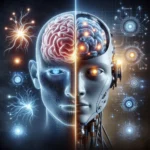**Unveiling the Intelligence Showdown: Human vs. Artificial – A Study Insight**
In today’s rapidly evolving digital era, the concept of intelligence is undergoing a radical transformation. Traditional measures of cognitive prowess such as the IQ test are increasingly pitted against the burgeoning capabilities of artificial intelligence (AI). A study aptly titled “Comparison of Human Intelligence with Artificial Intelligence” delves into this fascinating juxtaposition, revealing insights that could redefine our understanding of intelligence in the 21st century.
**The Evolution of Intelligence Metrics**
For decades, IQ tests have been the benchmark for assessing human intelligence, offering a quantitative measure to gauge cognitive abilities such as logical reasoning, problem-solving, and memory. These tests have served as a predictive tool for academic performance and intellectual aptitude. However, questions linger about their ability to span the full spectrum of human intelligence, especially with the rise of AI.
**AI: The New Frontier of Intelligence Assessment**
Artificial intelligence has emerged as a disruptive force, challenging our preconceptions of what it means to be intelligent. Through machine learning algorithms and neural networks, AI systems have demonstrated remarkable proficiency in tasks that were once considered the exclusive domain of human intellect. The study in question places AI in direct comparison with human intelligence, pushing the boundaries of traditional IQ assessments.
**The Methodology: A Multifaceted Approach**
This groundbreaking study adopted a multifaceted approach to compare human and AI intelligence. Participants, both human and AI-powered systems, were subjected to a series of tests tailored to evaluate various dimensions of cognitive function. These tests included problem-solving exercises, pattern recognition tasks, and assessments of learning adaptability.
**Findings That Reshape Our Understanding**
The results were a revelation, underscoring the strengths and limitations inherent in both forms of intelligence. Humans demonstrated superiority in tasks requiring creativity, emotional understanding, and complex reasoning with ambiguous information. In contrast, AI excelled in data processing speed, consistency, and the execution of tasks with well-defined rules and parameters.
**The Synergistic Potential of Human and AI Collaboration**
One of the most intriguing outcomes of the study is the potential for synergy between human and artificial intelligence. Combining the creativity and emotional intelligence of humans with the computational power and efficiency of AI can lead to unprecedented problem-solving capabilities. This collaborative approach could unlock new levels of innovation across various fields, from healthcare to finance.
**Implications for Future IQ Testing and Intelligence Assessment**
The implications of this comparative study extend to the future of IQ testing and the broader assessment of intelligence. It calls for an updated framework that integrates AI’s capabilities, recognizing the multifaceted nature of intelligence in the modern world. The development of hybrid tests that accommodate both human and artificial cognition may lead to a more comprehensive understanding of intelligence.
**Looking Ahead: The Ongoing Journey of Intelligence Exploration**
The “Comparison of Human Intelligence with Artificial Intelligence” study is a significant milestone in the journey of understanding intellectual capabilities. As AI continues to evolve, it will be essential to revisit and refine the metrics we use to measure intelligence. The quest to quantify and comprehend intellect, whether biological or artificial, is far from over. It will remain a pivotal focal point for researchers, educators, technologists, and philosophers alike.
In the quest to define the essence of intelligence in an age where machines can learn, adapt, and even ‘think’, this seminal study serves as both a mirror and a map. It reflects our current state of knowledge while charting a course toward a future where human and artificial intelligence may not only coexist but also cooperate to achieve greater heights than ever imagined.

